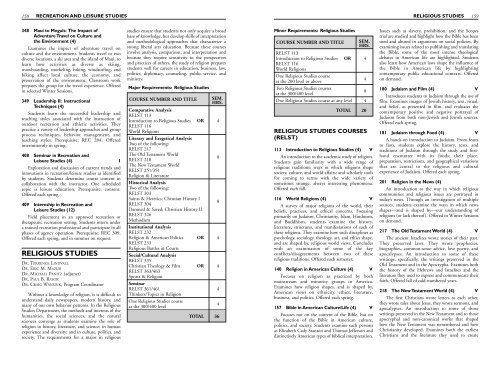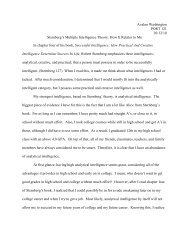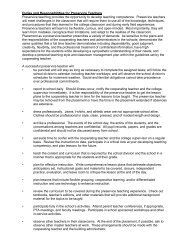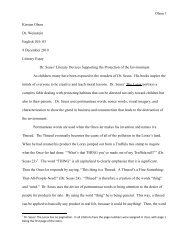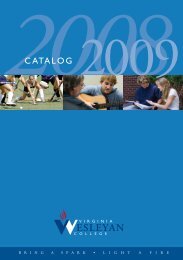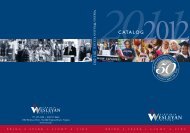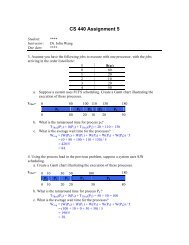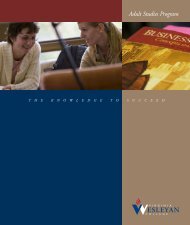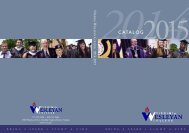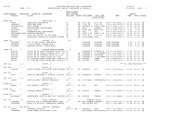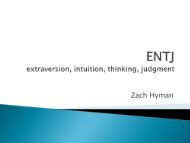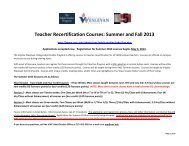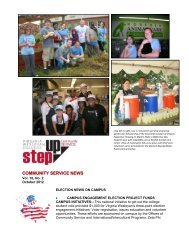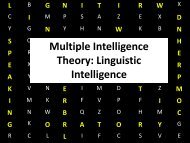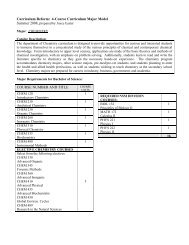156 RECREATION AND LEISURE STUDIESRECREATION AND LEISURE STUDIES157204 Leadership I: Leadership andAnalysis of Recreation (4)Explores leadership theory and the process ofactivity analysis. Students develop their personalleadership skills by observing, evaluating, andpracticing leadership styles. They also learn andpractice the activity analysis process through theplanning, implementation and evaluation of goalorientedactivities for diverse segments of thepopulation. Includes a significant practicalcomponent during nontraditional class hours whenstudents lead activities for peers and communityagencies. Lab fee. Offered each semester.206 Management of Recreation andLeisure Services I (4)An introduction to the principles of managingleisure service agencies. Students investigate the roleof the manager by applying underlying managementand legal theory to the operation of existing leisureservice agencies. Prerequisite: REC 101. Offered eachfall.212 Introduction to Recreational Therapy (4)Provides an overview of the profession ofrecreational therapy, including the philosophy,practice, procedures, and foundation of services forindividuals with disabilities. Students develop anunderstanding of professional preparation, servicesettings, and consumer groups that utilize recreationaltherapy services. Fieldwork required. Prerequisite:freshman/sophomore only; junior/senior withconsent. Offered each semester.219 Disability In the Media (4)Explores various disabilities and the relatedchallenges and prejudices experienced by individualswith disabilities and how these individuals aredisplayed in popular film. Examines physical,psychological, emotional, and social disabilities.Students also examine their own attitudes andperceptions regarding disabilities. Prerequisite:sophomore status or consent. Offered Winter Sessionon demand.305 Teaching Assistant (1)Provides recreation/leisure service majors or otherstudents who qualify the opportunity, undersupervision, to organize and lead recreation, physicaleducation activity courses, and selected introductorycontent courses (REC 101, 200, 201, 204, 205).Students are required to prepare lesson plans.Prerequisites: REC 204 or 323, or prior teachingexperience. Students must be interviewed andaccepted by the course instructor. Offered eachsemester.308 Historical, Cultural, andProfessional Dimensions ofRecreation and Leisure (4)WProvides students with knowledge of the history,philosophy, development, purposes, values, andinterrelationships of recreation delivery systems fromboth the private and public sectors. Focuses on theprofessional dimensions of recreation and leisure asthey relate to diverse cultures served in contemporarypractice. Prerequisites: ENG 105 with a grade of C orhigher and junior/senior status. Offered each fall.309 Internship Preparation inRecreation and Leisure Studies (2)Provides guidance and direction in all phases ofinternship procurement for all students majoring inrecreation and leisure studies and enrolling in REC409 the following semester. Emphasizes eachstudent’s self-assessment, documentation ofpersonal/professional goals, strengths, and areas forimprovement in relation to the agency’s attributes andcompatibility with the student’s goals. Gradedpass/fail. Prerequisite: senior and eligible to completeREC 409 the following semester. Offered eachsemester.310 Disabilities and Recreational Therapy (4)Introduces students to the various disablingconditions that typically receive recreational therapyservices. Explores adaptive, corrective and progressiverecreational therapy techniques for a variety ofdisabling conditions. Emphasizes treatmentinterventions and leisure skills as they relate tospecific disorders and habilitative or rehabilitativegoals. Offered each spring.311 Recreational Therapy Process (4) WProvides students with the knowledge and skillsneeded to organize, conduct, and evaluaterecreational therapy programs in health care agencies.Requires students to develop a written plan ofoperation for an agency providing recreationaltherapy services. Field experience is required.Prerequisite: ENG 105 with a grade of C or higher.Offered each fall.313 Recreational Therapy Managementand Organization (4)Provides students with the knowledge and skillsneeded to organize, conduct, and evaluaterecreational therapy programs in healthcare agencies.Students develop a written plan of operation for anagency providing recreational therapy services. Fieldexperience is required. Prerequisite: REC 212.Offered each spring.314 Recreational Therapy Analysisand Assessment (4)Provides the rationale, procedural methods for,and applications of assessment in recreational therapy.Students examine and use standardized instrumentsand develop a functional assessment based on the useof activity/task analysis. They learn methods ofclinical assessment, establishing client rapport, andinterpretation and documentation of assessmentresults. Prerequisite: REC 212. Offered each fall.316 Planning, Implementing, andEvaluating Recreational Therapy (4)Prepares students in the planning, implementation,and evaluation of recreational therapy services.Includes the selection of appropriate treatmenttechniques and clinical skills to be used with variousclient populations, intervention strategies, andmethods of evaluating client and program outcomes.Prerequisite: REC 212.336 Commercial Recreation (4)Analyzes the principles of organizing commercialrecreation agencies and the factors affecting theirsuccess. Emphasizes field evaluation and case studiesof specific agencies currently in operation. Offeredspring of odd-numbered years.340 Recreation Program Principles (4) WProvides students with an understanding ofrecreation program practices, including planningobjectives, programming principles, organization,group work, promotion supervision, and programevaluation. In addition to the study of programmingtheory, students plan, organize, and evaluate a varietyof recreation programs. Suggested prerequisites: REC101 and 204. Prerequisite: ENG 105 with a grade ofC or higher. Offered each fall.341 Management of Recreation andLeisure Services II (4)Students develop an understanding ofadministrative practices, including legal aspects ofrecreation services, principles of planning andoperation of recreation areas and facilities, financialand business procedures, public relations, principlesof organization and coordination of services,personnel practices, and evaluation. Provides afoundation on which future depth of administrativecompetency can build. Offered each spring.342 Fieldwork in Recreationand Leisure Studies (4)WOffers the opportunity to investigate theleadership, programming, operation, andmanagement of leisure service agencies while gainingpaid or volunteer experience. Through acomprehensive focus on individual areas ofadministration, the course is tailored to the individualneeds of the student and agency to maximizeexperience and reflection. Prerequisites: ENG 105with a grade of C or higher and REC 204 or consent.Offered each semester and summer.343 Administration of CampusRecreation (4)Covers the planning, organization, administration,and evaluation of recreational sports programsin colleges and universities. Emphasizes practicalexperiences designed to acquaint the student withcontemporary administration practices in the field.Offered fall of even-numbered years.344 Introduction to Sport andFacility Management (4)Provides students majoring in recreation andleisure studies with an extensive knowledge ofeffective management in a variety of sports settings.Covers specific skills needed to plan and maintainrecreation facilities. Private and public schools andsport club environments are explored. Prerequisite:REC 101. Offered each spring.345 Ropes Course and GroupFacilitation Methods (4)Prepares students to become ropes course leadersand facilitate the ability of groups to better achievetheir goals. Through coverage of the factorsconnected to initial group processes, conflict, goaldeliberation, and the role of the facilitator, the courseprovides hands-on activities, enabling the student toexperience the responsibilities needed to become auseful group facilitator. Lab fee. Offered each fall.346 Travel and Tourism (4)Introduces the principles of travel and tourism asan element of leisure service delivery. Covers tourismdevelopment and promotion from both the publicand private sectors. Students investigate varioussocioeconomic factors of travel and tourism and visitvarious travel and tourism agencies. Offered each fall.347 Outdoor Recreation and Education (4)A series of experiences, discussions, and readingsabout current issues and practices in outdoorrecreation and education. Students plan, prepare, andimplement an overnight backcountry experience.Requires an overnight field experience outside ofregularly scheduled class meetings. Lab fee. Offeredeach spring and intermittently in Winter Sessions orsummer.
158 RECREATION AND LEISURE STUDIESRELIGIOUS STUDIES159348 Maui to Moguls: The Impact ofAdventure Travel on Culture andthe Environment (4)Examines the impact of adventure travel onculture and the environment. Students travel to twodiverse locations, a ski area and the island of Maui, tolearn how activities as diverse as skiing,snowboarding, snorkeling, hiking, windsurfing, andbiking affect local culture, the economy, andpreservation of the environment. Classroom workprepares the group for the travel experience. Offeredin selected Winter Sessions.349 Leadership II: InstructionalTechniques (4)Students learn the successful leadership andteaching styles associated with the instruction ofoutdoor recreation and athletic activities. Theypractice a variety of leadership approaches and groupprocess techniques, behavior management, andteaching styles. Prerequisite: REC 204. Offeredintermittently in spring.408 Seminar in Recreation andLeisure Studies (4)IExploration and discussion of current trends andinnovations in recreation/leisure studies as identifiedby students. Students determine course content incollaboration with the instructor. One scheduledtopic is leisure education. Prerequisite: consent.Offered each spring.409 Internship in Recreation andLeisure Studies (12)Field placement in an approved recreation ortherapeutic recreation setting. Students intern undera trained recreation professional and participate in allphases of agency operation. Prerequisite: REC 309.Offered each spring, and in summer on request.RELIGIOUS STUDIESDR. TERRENCE LINDVALLDR. ERIC M. MAZURDR. MICHAEL PANITZ (adjunct)DR. PAUL B. RASORDR. CRAIG WANSINK, Program CoordinatorWithout a knowledge of religion, it is difficult tounderstand daily newspapers, modern history, andmany of our own behavior patterns. In the ReligiousStudies Department, the methods and interests of thehumanities, the social sciences, and the naturalsciences converge as students examine the role ofreligion in history, literature, and science; in humanexperience and diversity; and in culture, politics, andsociety. The requirements for a major in religiousstudies ensure that students not only acquire a broadbase of knowledge, but develop skills of interpretationand methodological approaches that characterize astrong liberal arts education. Because these coursesinvolve analysis, comparison, and interpretation andbecause they require sensitivity to the perspectivesand practices of others, the study of religion preparesstudents well for careers in education, business, law,politics, diplomacy, counseling, public service, andministry.Major Requirements: Religious StudiesCOURSE NUMBER AND TITLE SEM.HRS.Comparative AnalysisRELST 113Introduction to Religious Studies OR 4RELST 116World ReligionsLiterary and Exegetical AnalysisTwo of the following:RELST 217The Old Testament WorldRELST 2188The New Testament WorldRELST 251/351Religion & LiteratureHistorical AnalysisTwo of the following:RELST 303Saints & Heretics: Christian History IRELST 3048Damned & Saved: Christian History IIRELST 326MethodismInstitutional AnalysisRELST 232Religion & American Politics OR 4RELST 233Religious Battles in CourtsSocial/Cultural AnalysisRELST 335Christian Theology & Film OR 4RELST 363/463Sports & ReligionSeminarRELST 361/461 4Thinkers/Topics in ReligionOne Religious Studies courseat the 300/400 level4TOTAL 36Minor Requirements: Religious StudiesCOURSE NUMBER AND TITLESEM.HRS.RELST 113Introduction to Religious Studies OR 4RELST 116World ReligionsOne Religious Studies courseat the 200 level or above4Two Religious Studies coursesat the 300/400 level8One Religious Studies course at any level 4TOTAL 20RELIGIOUS STUDIES COURSES(RELST)113 Introduction to Religious Studies (4) VAn introduction to the academic study of religion.Students gain familiarity with a wide range ofreligious traditions; ways in which religions shapesociety, culture, and world affairs; and scholarly toolsfor coming to terms with the wide variety ofsometimes strange, always interesting phenomena.Offered each fall.116 World Religions (4) VA survey of major religions of the world, theirbeliefs, practices, and ethical concerns. Focusingprimarily on Judaism, Christianity, Islam, Hinduism,and Buddhism, students examine the history,literature, structures, and manifestations of each ofthese religions. They examine how such disciplines aspsychology, sociology, theology, art, and ethics shape,and are shaped by, religious world views. Concludeswith an examination of some of the keyconflicts/disagreements between two of thesereligious traditions. Offered each semester.140 Religion in American Culture (4) VFocuses on religion as practiced by bothmainstream and minority groups in America.Examines how religion shapes, and is shaped by,American views on ethnicity, ethics, literature,business, and politics. Offered each spring.157 Bible in American Culture/Life (4) VFocuses not on the content of the Bible, but onthe function of the Bible in American culture,politics, and society. Students examine such personsas Elizabeth Cady Stanton and Thomas Jefferson anddistinctively American types of biblical interpretation.Issues such as slavery, prohibition, and the Scopestrial are studied and highlight how the Bible has beenused and abused in arguments on social policies. Byexamining issues related to publishing and translatingthe Bible, some of the most intense theologicaldebates in American life are highlighted. Studentsalso learn how American laws shape the influence ofthe Bible in American life by highlightingcontemporary public educational contexts. Offeredon demand.180 Judaism and Film (4) VIntroduces students to Judaism through the use offilm. Examines images of Jewish history, text, ritual,and belief, as presented in film, and evaluates thecontemporary positive and negative portrayal ofJudaism from both non-Jewish and Jewish sources.Offered each spring.181 Judaism through Food (4) VA hands-on introduction to Judaism. From feaststo fasts, students explore the history, texts, andtraditions of Judaism through the study and firsthandencounter with its foods; their place,preparation, restrictions, and geographical variationsthat are central to the religious and culturalexperience of Judaism. Offered each spring.201 Religion in the News (4)An introduction to the way in which religiouscommunities and religious issues are portrayed intoday’s news. Through an investigation of multiplesources, students examine the ways in which newsshapes—and is shaped by—our understanding ofreligions (or lack thereof). Offered in Winter Sessionson demand.217 The Old Testament World (4) VThe ancient Israelites wrote stories of their past.They preserved laws. They wrote prophecies,biographies, common-sense advice, love poetry, andapocalypses. An introduction to some of thesewritings; specifically, the writings preserved in theOld Testament and in the Apocrypha. Examines boththe history of the Hebrews and Israelites and theliterature they used to express and communicate theirfaith. Offered fall of odd-numbered years.218 The New Testament World (4) VThe first Christians wrote letters to each other,they wrote tales about Jesus, they wrote sermons, andapocalypses. An introduction to some of thosewritings preserved in the New Testament and to thoseapocryphal and non-canonical works that shapedhow the New Testament was remembered and howChristianity developed. Examines both the earliestChristians and the literature they used to create


